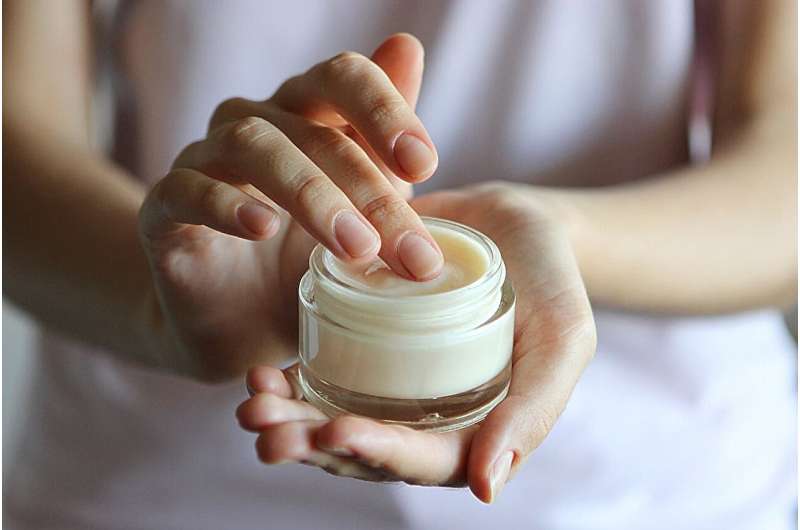This article has been reviewed according to Science X's editorial process and policies. Editors have highlighted the following attributes while ensuring the content's credibility:
fact-checked
peer-reviewed publication
reputable news agency
proofread
Chemicals in makeup, sunscreen may raise odds for dangerous pregnancy complication

Chemicals commonly found in sunscreen, makeup and other personal care products could be putting pregnancies at risk, a new study warns.
Phenols and parabens in these products increase a pregnant woman's risk of high blood pressure by 57%, particularly at 24 to 28 weeks of gestation, researchers reported Aug. 14 in the journal Environmental Health Perspectives.
"We found chemicals in everyday soaps, lotions, makeup, sunscreen and other personal care products and consumer products [that] increased risk of hypertension" among a study group of pregnant women in Puerto Rico, said study lead researcher Julia Varshavsky. She's an assistant professor of health sciences at Northeastern University in Boston.
Phenols and parabens are used as UV filters in sunscreens, and to prevent the growth of harmful mold and bacteria in makeup and cosmetics, researchers said.
Parabens alone are used in about 80% of personal care products, the research team said in background notes.
Phenols' and parabens' link to hypertension in pregnancy is troubling. High blood pressure during pregnancy reduces blood flow to the placenta, so the fetus might wind up starved of oxygen and nutrients. As a result, the fetus might suffer from restricted growth, low birth weight and premature birth, the researchers explained.
It's dangerous for expecting moms as well, increasing their risk of complications like preeclampsia and stroke.
Both mother and child also have an increased likelihood that they will suffer from high blood pressure, diabetes and heart disease long after pregnancy.
Looking at chemicals in personal care products "is really important for pregnant individuals in particular because women on average, use at least 12 personal care products a day," Varshavsky noted. "And the fact that these can increase, may increase, risk of hypertension during pregnancy is important, because that sets the stage for lifelong health in both the mother and the child."
For the study, researchers tracked the health of more than 1,000 pregnant women in northern Puerto Rico.
Urine tests showed the levels of 12 phenols and parabens for each expecting mom, whose blood pressure was tested early and later in their pregnancy.
"Overall, we found that exposure to phenols and parabens during pregnancy is associated with maternal blood pressure differences and, further, that exposure to these chemicals, both separately and together, increases the risk of hypertension during pregnancy, especially later in pregnancy," the researchers concluded in the study.
There are several reasons why the chemicals might be increasing blood pressure in pregnant women, the researchers said.
Phenols and parabens are known to increase inflammation and oxidative stress in humans, which has been linked to high blood pressure, researchers noted.
The chemicals also are known to disrupt hormones in humans, and these hormones also play a role in regulating blood pressure, they added.
Varshavsky's advice: Women who are pregnant (and even when they are not) may want to consider cutting back on certain products.
"The approach I take in my personal life is to try to mitigate exposure when I can, so ... when I was pregnant, I did try to limit the amount of products I use more so than I would otherwise, she said. "I definitely would suggest to try to focus on fragrance-free products and products that have been identified or labeled as paraben-free, for example, which is something that is occurring."
Varshavsky also noted that, "the good thing about phenols and parabens are that these chemicals have short biological half-lives, which basically means that we metabolize them relatively quickly. So, if we reduce our exposure, the levels in our bodies go down pretty quickly."
Nevertheless, "this is not a problem that we can necessarily shop our way out of," Vashavsky added.
Study senior researcher Stephanie Eick agreed. She's an assistant professor at Emory University's Rollins School of Public Health in Atlanta.
"Our findings show that the FDA and the EPA need to be doing a better job of protecting public health from harmful chemical exposures during pregnancy," she said in a Northeastern news release.
"Scientists, advocates and regulators need to work together to increase product labeling and industry responsibility to ensure chemicals are proven to be safe before being put into commerce," Eick added. "We also need industry innovation to identify safer alternatives and upstream solutions to this problem."
More information: ulia R. Varshavsky et al, Association of Phenols, Parabens, and Their Mixture with Maternal Blood Pressure Measurements in the PROTECT Cohort, Environmental Health Perspectives (2024). DOI: 10.1289/EHP14008
The Environmental Working Group has more on parabens. J
© 2024 HealthDay. All rights reserved.





















